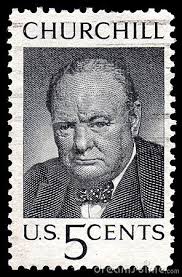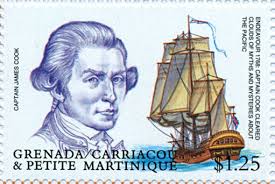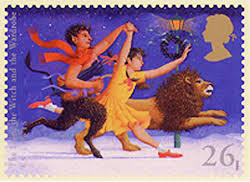 |
If Spock is half-human even though
he was born on Vulcan, can
we also claim Churchill as
half-American? |
In 2002, the BBC conducted a survey of the "100 greatest Britons." In some ways, the poll stands as a remarkable measure of what a little island can accomplish, when it puts its head to getting things done. In another way, I have to say it makes me kind of glad I'm not British anymore . . . that for a few hundred years, our lines have veered apart.
 |
| Because how come? |
Why? First, modern Brits who make the list are mostly celebrities, famous for writing songs or having annoying people follow them around with cameras. It's embarrassing that celebrity culture overshadows history so easily (it frightens me to think what a poll of Americans would reveal -- Eminem as Third Greatest American Ever?). And second, the real movers and shakers, great men and women who changed the world, largely for the better, mostly lived a long time ago, before the sun ever set. That was also when (let me add) the Bible had more to say to the hearts of Britain's greatest heroes.
Let's take them in groups of ten, reserving comments for after each decade. Then at the end, I'll suggest a few other Brits one might nominate to replace the dingy of this list. Your suggestions are also welcome. (Record page reads lately, but readers have been unusually reserved -- we welcome input!)
1. Winston Churchill, (1874-1965) - Prime Minister (1940-1945, 1951–1955)
2. Isambard Kingdom Brunel, (1806–1859) - Engineer.
3. Diana, Princess of Wales (1961–1997) - First wife of Charles, Prince of Wales; mother of Prince William; Prince Harry of Wales.
4. Charles Darwin (1809–1882) - Naturalist; the originator of the theory of evolution through natural selection and author of 'On the Origin of Species'.
5. William Shakespeare (1564–1616) - English poet; playwright.
 6. Sir Isaac Newton (1643–1727) - Mathematician, physicist, astronomer, natural philosopher, and alchemist.
6. Sir Isaac Newton (1643–1727) - Mathematician, physicist, astronomer, natural philosopher, and alchemist.
7. Queen Elizabeth I of England (1533-1603) - Monarch (reigned 1558-1603).
8. John Lennon (1940–1980) - Musician with The Beatles.
9. Vice Admiral Horatio Nelson, 1st Viscount Nelson (1758–1805) - Naval commander.
10. Oliver Cromwell (1599–1658) - Lord Protector
Churchill? I'd be happy to keep him in the Top Five. But was he really greater than Shakespeare, Darwin, or Queen Elizabeth? Well, maybe . . . there has only been one Hitler in Western history, and Churchill was his greatest foe.
I've never heard of Brunel. Skimming the Wikipedia site, I'm still at a loss at how he reached number two. Let's drop him down a few classes.
Lady Di was greater than William Shakespeare, Queen Elizabeth, or King Alfred? Was it the hat? Sorry, Di, your nice charitable work and Elton John aside, I frankly still don't get the "Lady Di" phenomena.
Lennon is going to have to go, too, I'm afraid. Nice songs, but he should be embarrased, standing on the platform with Shakespeare. Let's replace Di with John Wesley, Lennon with Charles Dickens, and Brunel with . . . oh, I don't know, let's see who else we find downstream.
11. Sir Ernest Shackleton (1874–1922) - Polar explorer.
 |
| Captain Cook sails to glory. |
12. Captain James Cook (1728–1779) - Explorer.
13. Robert Baden-Powell, 1st Baron Baden-Powell (1857–1941) - Boy Scouts; Girl Guides founder.
14. Alfred the Great (849?–899) - King of Wessex (reigned 871–899).
15. Arthur Wellesley, 1st Duke of Wellington (1769–1852) - Military commander, statesman; Prime Minister 1828–1830 ; 1834.
16. Margaret Thatcher, Baroness Thatcher (1925-) - Prime Minister (1979–1990).
17. Michael Crawford (1942-) - Actor; singer.
18. Queen Victoria of the United Kingdom (1819–1901) - Monarch (reigned 1837–1901).
19. Sir Paul McCartney (1942-) - Musician with The Beatles.
20. Sir Alexander Fleming (1881–1955) - Biologist, pharmacologist, discoverer of penicillin.
Shackleton's story is amazing, his courage and the survival of his crew heroic, but what did he achieve, really? While I agree with her politics, this seems a bit high for Lady Thatcher, too. And who is Michael Crawford? One slot up on Queen Victoria? And what's with all the Beetles?

Alfred the Great, who did as much as anyone to make England, probably belongs in the Top Ten. Queen Victoria is the only other person here who seems a bit low.
21. Alan Turing (1912–1954) - Pioneer of computing.
22. Michael Faraday (1791–1867) - Scientist.
23. Owain Glyndŵr (1359–1416) - Prince of Wales.
24. Queen Elizabeth II of the United Kingdom (1926-) - Reigning monarch (from 1952).
25. Professor Stephen Hawking (born 1942) - Theoretical physicist.
26. William Tyndale (1494–1536) - English translator of the Bible.
27. Emmeline Pankhurst (1858–1928) - Suffragette.
28. William Wilberforce (1759–1833) - Humanitarian.
29. David Bowie (1947-) - Musician.
30. Guy Fawkes (1570–1606) - English revolutionary.
Aside from the last two, I don't have much to complain about with the third class of greats. (No, I don't know who 23 is, either.)
Wilberforce, of course I would move way, way up. Maybe into the Top Five. David Bowie, way, way, down -- no not quite into the bottom five. Off this list, though, along with Guy Fawkes, who is famous mainly for being an incompetent terrorist, and having a fun useless holiday named after him.
 31. Leonard Cheshire, Baron Cheshire (1917–1992) - Aviator; charity organiser.
32. Eric Morecambe (1926–1984) - Comedian.
33. David Beckham (1975-) - Footballer.
34. Thomas Paine (1737–1809) - Political philosopher.
35. Boudica (died c.60) - Leader of Celtic resistance to Roman Empire.
36. Sir Steve Redgrave (1962-) - Olympic rower.
37. Saint Thomas More (1478–1535) - English saint, lawyer; politician.
38. William Blake (1757–1827) - Author, poet, painter & printer.
39. John Harrison (1693–1776) - Clock designer.
31. Leonard Cheshire, Baron Cheshire (1917–1992) - Aviator; charity organiser.
32. Eric Morecambe (1926–1984) - Comedian.
33. David Beckham (1975-) - Footballer.
34. Thomas Paine (1737–1809) - Political philosopher.
35. Boudica (died c.60) - Leader of Celtic resistance to Roman Empire.
36. Sir Steve Redgrave (1962-) - Olympic rower.
37. Saint Thomas More (1478–1535) - English saint, lawyer; politician.
38. William Blake (1757–1827) - Author, poet, painter & printer.
39. John Harrison (1693–1776) - Clock designer.
 |
"You were not mad, I know time
will tell, William Blake."
-- Daniel Amos Band |
40. King Henry VIII of England (1491–1547) - Monarch (reigned 1509–1547).
Sorry, no "footballers" on my list. I just don't believe that's possible. Nor rowers, nor comedians, at least not ones I've never heard of. This is just trying to pad the 20th Century, and make it look better than it really was.
If we're going to have Blake, whom I don't mind, shouldn't Chaucer have shown up, yet, or Dickens? Psychodelic is all right, in its way, but funny is better.
Henry VIII was great at what, again?
41. Charles Dickens (1812–1870) - Author.
42. Sir Frank Whittle (1907–1996) - Jet engine inventor.
43. John Peel (1939–2004) - Broadcaster.
44. John Logie Baird (1888–1946) - Television pioneer.
45. Aneurin Bevan (1897–1960) - Labour politician, helped in formation of the National Health Service.
46. Boy George (1961-) - Musician with Culture Club.
47. Sir Douglas Bader (1910–1982) - Aviator & charity campaigner.
48. Sir William Wallace (c.1270–1305) - Guardian of Scotland.
49. Sir Francis Drake (c.1540–1596) - English naval commander.
50. John Wesley (1703–1791) - Methodism founder.
John Wesley, who changed the world (and for the better, overwhelmingly) comes 4 spots after Boy George, who changed what -- his gender? Sorry, George, you fall in behind David Bowie. A broadcaster? A television pioneer? What is that? Off the list.
51. King Arthur - Celtic monarch of legend.
52. Florence Nightingale (1820–1910) - Nurse.
53. T. E. Lawrence (Lawrence of Arabia) (1888–1935) - Soldier & arabist.
54. Robert Falcon Scott (1868–1912) - Polar explorer.
55. Enoch Powell (1912–1998) - Politician.
56. Sir Cliff Richard (1940-) - Musician.
57. Alexander Graham Bell (1847–1922) - Telephone pioneer.
58. Freddie Mercury (1946–1991) - Musician with band Queen.
59. Dame Julie Andrews (1935-) - Actress & singer.
60. Sir Edward Elgar (1857–1934) - Composer.
I'm tempted to keep Mary Poppins where she is, for fear she flies up with her umbrella and directs bombardments on my position from that looney retired naval commander down the street. But I'm afraid Cliff Richard and Freddie Mercury are going to have to go. Actually, the first three and Bell are the only names here whom I'm sure belong.
61. Queen Elizabeth, the Queen Mother (1900–2002) - Queen consort.
62. George Harrison (1943–2001) - Musician with The Beatles.
63. Sir David Attenborough (1926-) - Broadcaster.
 64. James Connolly (1868–1916) - Scottish born leader of the Irish 1916 rising.
65. George Stephenson (1781–1848) - Railway pioneer.
66. Sir Charlie Chaplin (1889–1977) - Comic actor, film director.
67. Tony Blair (1953-) - Prime Minister (1997–2007).
68. William Caxton (c.1415~1422–c.1492) - English printer.
69. Bobby Moore (1941–1993) - Footballer; Captain of England 1966 World Cup winning team.
70. Jane Austen (1775–1817) - Author.
64. James Connolly (1868–1916) - Scottish born leader of the Irish 1916 rising.
65. George Stephenson (1781–1848) - Railway pioneer.
66. Sir Charlie Chaplin (1889–1977) - Comic actor, film director.
67. Tony Blair (1953-) - Prime Minister (1997–2007).
68. William Caxton (c.1415~1422–c.1492) - English printer.
69. Bobby Moore (1941–1993) - Footballer; Captain of England 1966 World Cup winning team.
70. Jane Austen (1775–1817) - Author.
All right, all right, I'll let you have one Beetle! But just pick one. And no higher than 80th. George Harrison? Come on! Charlie Chaplin I can see. (But not hear.)
What did Tony Blair accomplish, exactly? I liked his debating style, and appreciate the fact that he brought Britain in on the side of the Americans after 9/11. But he's been a bit of a kiss-up to the Muslims ever since. I don't see it.
Jane Austen? Yeah, I can buy that, maybe even more of it.
 71. William Booth (1829–1912) - Founder of Salvation Army.
72. King Henry V of England (1387–1422) - Monarch (reigned 1413–1422).
73. Aleister Crowley (1875–1947) - Occultist, writer, social provocateur; founder of Thelema.
74. Robert the Bruce (1274–1329) - King of Scots.
75. Bob Geldof (1951-) - Irish musician, philanthropist.
76. The Unknown Warrior - Soldier of the Great War.
77. Robbie Williams (1974-) - Musician; previous member of Take That.
78. Edward Jenner (1749–1823) - Pioneer of vaccination.
79. David Lloyd George, 1st Earl Lloyd George (1863–1945) - Prime Minister (1916–1922).
80. Charles Babbage (1791–1871) - Computing pioneer; mathematician.
71. William Booth (1829–1912) - Founder of Salvation Army.
72. King Henry V of England (1387–1422) - Monarch (reigned 1413–1422).
73. Aleister Crowley (1875–1947) - Occultist, writer, social provocateur; founder of Thelema.
74. Robert the Bruce (1274–1329) - King of Scots.
75. Bob Geldof (1951-) - Irish musician, philanthropist.
76. The Unknown Warrior - Soldier of the Great War.
77. Robbie Williams (1974-) - Musician; previous member of Take That.
78. Edward Jenner (1749–1823) - Pioneer of vaccination.
79. David Lloyd George, 1st Earl Lloyd George (1863–1945) - Prime Minister (1916–1922).
80. Charles Babbage (1791–1871) - Computing pioneer; mathematician.
To General Booth, "Friend, move up to a better place!" And to Crowley . . . how did you get in here? Don't close the door on the way out!
I had honestly never heard of Robbie Williams: apparently he's a drug-addicted, chain-smoking, morally perverse singer who's managed to sell 70 million albums. Good for him. Let the money and the songs (if they are any good, which one must assume they are) be their own reward. Make another list for "Britain's 100 biggest party-boy celebrities," and you're a shoo-in. Geldof apparently has done good things with his fame, so I'll let him remain.
81. Geoffrey Chaucer (c.1343–1400) - Medieval author.
82. King Richard III of England (1452–1485) - Monarch (reigned 1483–1485).
 |
An Englishman on a French
stamp: if that doesn't prove
(publishing) magic, what could? |
83. J.K. Rowling (1965-) - Harry Potter Series author.
84. James Watt (1736–1819) - Steam engine developer.
85. Sir Richard Branson (1950-) - Businessman.
86. Bono (1960-) - Irish musician (Singer for Rock Band U2), philanthropist.
87. John Lydon (Johnny Rotten) (1956-) - Musician.
88. Bernard Law Montgomery, 1st Viscount Montgomery of Alamein (1887–1976) - Military commander.
89. Donald Campbell (1921–1967) - Water speed world record challenger.
90. King Henry II of England (1133–1189) - Monarch (reigned 1154–1189).
Finally Chaucer! I'll assume Rotten (whoever he is) is just here to pad the 20th Century numbers. Montgomery? I have my doubts. And no "water speed challengers" need apply.
Bono, I'm happy to include. The man has good tunes, then parlayed them into doing something good for the world.
Not Branson, though. I've heard things, I'm skeptical.
91. James Clerk Maxwell (1831–1879) - Physicist.
92. J.R.R. Tolkien (1892–1973) - Author; philologist.
93. Sir Walter Raleigh (1552–1618) - English explorer.
94. King Edward I of England (1239–1307) - Monarch (reigned 1272–1307).
95. Sir Barnes Wallis (1887–1979) - Aviation technology pioneer.
96. Richard Burton (1925–1984) - Actor.
 |
| Dr. Livingstone, I presume? |
97. Tony Benn (1925-) - Politician; formerly 2nd Viscount Stangate.
98. David Livingstone (1813–1873) - Missionary; explorer.
99/ Sir Tim Berners-Lee (1955-) - Internet pioneer; World Wide Web inventor.
100. Marie Stopes (1880–1958) - Birth control promoter.
Of course Tolkien is too low. And we've had enough actors. Tony Benn looks like more padding, as does Marie Stopes.
But who are we missing?
Britain is not my country, so Brits reading this have every right to box my ears over my various impieties. But my ancestors did share most of the history represented by these names, so I'm going to make a few suggestions, anyway:
St. Patrick
John Scotus.
Roger Bacon.
John Bunyan.
John Locke. (Top 20)
John Milton. (You can ever have too many Johns. . . )
Francis Bacon.
Robert Hooke.
George Handel -- don't tell me the 20th Century (or the devil) had all the best music!
Robert Boyle, maybe.
William Carey. (Top 10)
Hudson Taylor.
Rudyard Kipling
Mary Slessor.

Timothy Richard.
C. S. Lewis. (You knew I was going to say that!)
Paul Brand. (Need to include someone I have actually talked with on the list, to satisfy Locke's empiricism.)
"How about your list of the greatest Americans?" You ask.
Let's wait another 500 years for that. Mary Poppins, after all, was partly about nostalgia for a lost empire. We should at least wait till the end of the second Obama term, by which time the country's slide from glory should be far enough along to inspire great works of wistfulness.
Any more suggestions?
